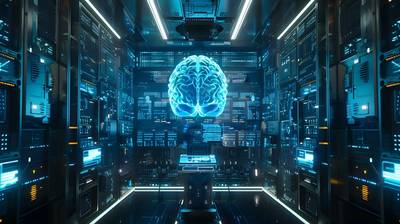Tip #60 - AI & Maritime Trainers ... "Watch Your Back ... " [Part II]
Training Tips for Ships [#60]
Last month’s Training Tips for Ships discussed the role of Artificial Intelligence (AI) in the future of maritime training. My thoughts on this were triggered by the recent headline in the Financial Times: “Andreessen Horowitz raises $7.2bn and sets sights on AI start-ups“. Andreessen Horowitz is one of Silicon Valley’s most prominent venture capital firms and they are seeing fit to deeply invest in the burgeoning AI revolution. Typically, this means change is upon us on a timescale that is now very meaningful to us.
As I said in last month’s article, AI is no longer a “tomorrow” thing. It is a “today” thing.
The question at hand for the purposes of Training Tips for Ships is whether AI will replace us as maritime trainers. Last month we made the argument that it could. This month, we look at the more comforting (to some) counter arguments - those supporting the idea that AI could never fully replace us humans in our role as maritime trainers. The strongest arguments against AI fully replacing us tend to focus on the human element or the soft skills that trainers bring to the training experience. Can an AI replicate these? It depends on your opinion of what the future brings - so let’s look at some examples of these arguments.
Our first argument focuses on the role that the emotional connection between trainer and trainee plays in the learning experience. Many argue that AI would struggle to form these genuine connections and therefore would be unable to understand the deeper nuances of human emotions. Human empathy, intuition, and the ability to build trust would be compromised and it is reasonable to think that their lack could affect the training experience.
Another argument focuses on AI’s simple lack of a physical body, and the experience derived from using that body in a maritime setting. AI might be able to simulate or model physical skills, but the learnings gained from actually performing these tasks in real-world conditions is (for now) unique to humans. Maritime trainers' firsthand experiences allow them to convey subtle, real-world insights that an AI might struggle to understand and convey. On the other side of this, any aspects of maritime training that require the demonstration of physical skills could obviously pose a problem for an AI. How can it get around this basic issue?
A third argument comes in the form of an AI’s ability to mentor a trainee and act as a role model. The role of a mentor goes beyond knowledge transfer; it involves inspiring, motivating, and guiding individuals in their careers. The mentor-mentee relationship is deeply personal and relational, requiring trust, respect, and confidence. This is something that an AI, no matter how advanced, might find hard to authentically replicate.
This brings us to the fundamental questions of trust and credibility. To truly act as an effective trainer and mentor, the trainer must earn the trust of the trainee. Trainees trust trainers who share their experiences, who can demonstrate expertise, and who have “been there and done that”. Trust is a fundamental element in quality training relationships. Human trainers earn credibility through their careers and personal connections, while AI, regardless of sophistication, might have a hard time establishing the same level of trust.
We expect that AIs, at least in certain areas, will greatly surpass human abilities. They already have. However, all the above examples rely on the assumption that there will be limits on how authentically an AI can reproduce human thoughts and emotions. But remember - the endgame of AI research is not to mimic the thoughts of humans, but rather to generate an intelligence that actually has those thoughts, emotions and (eventually) experiences. If AI research gets there (and in my opinion it certainly will), then the only remaining argument against AI replacing human trainers is whether the humans being trained are biased against AIs and therefore inherently skeptical of them as trainers. But if AIs actually become excellent trainers, then even this impediment will likely be short lived.
And, of course, this article ignores the potentially bigger question of whether we will need to train humans at all in our future AI-populated maritime environment.
No one can tell us with certainty what the future holds for AI and its effects on us and the maritime world. It is simply too unknown and complex to reliably predict. Therefore, we will have to wait and see. But with absolute certainty we can say that change is coming, that it will not take long, and that it will not be boring.
Thank you for reading and until next time, train well and sail safely.













